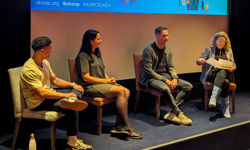
Getting it wrong
Channel 4’s Jon Snow giving the MacTaggart lecture: "Over this past year, we – me included – mostly London-based media pundits, pollsters and so-called experts, have got it wrong. The Brexit referendum: we got that wrong. Trump defied so-called experts, pundits and journalists alike. Theresa May’s strange general election – predicted to get a majority of 60-70: we got that wrong too. The Grenfell Tower disaster taught me a harrowing lesson – that in increasingly fractured Britain, we in the media are comfortably with the elite, with little awareness, contact, or connection with those not of the elite."
Trust in the media
Ray Snoddy in the Observer: “What we’ve seen this year is that ‘mainstream media’ has changed from a general description into a term of abuse. We’ve seen trust in media ebb and flow over many years but there’s been nothing like this before.”
General Election
Polly Toynbee in the Guardian: "But oh to see Paul Dacre’s face when the exit poll came in! After the Daily Mail’s savage trashing of the Corbyn team, he saw his greatest acolyte, May, fail, despite a hysterical anti-Labour hate-campaign from his paper, the Sun and the Telegraph. But expect no humble pie from them."
Jeremy Corbyn in his Labour Party conference speech: “One paper devoted 14 pages to attacking the Labour Party and the following day our vote went up nearly 10 per cent. Never have so many trees died in vain. The British people saw right through it. So this is a message to The Daily Mail’s editor - next time please make it 28 pages.”
Gary Younge in Prospect magazine on Jeremy Corbyn: "There are two main reasons why many journalists were wrong-footed. The first was a chronic lack of curiosity. This, I believe, to be the most egregious professional malpractice. The issue here is not whether they supported Corbyn or even Labour but the brazen certainty with which so many dismissed him and his supporters, and the credulity with which they treated his detractors… The second great failure of journalism was the failure to expand the gaze from Corbyn, the individual, to broader forces and places."
Katie Perrior, ex-director of communications at Downing Street, in The Times on Theresa May: "If you run a presidential style campaign with a woman who doesn’t like media interviews, then you have to accept that it’s better to do them and run the risk that they go badly than look like you are running scared."
Trump on the media
Trump speaking at CIA headquarters: "As you know I have a running war with the media. They are among the most dishonest human beings on earth."
Trump speaking in the Oval Office: “It is frankly disgusting the press is able to write whatever it wants to write.”
White House press secretary Sean Spicer to journalists, before he quit: "There's been a lot of talk in the media about the responsibility to hold Donald Trump accountable, and I'm here to tell you it goes two ways. We're going to hold the press accountable as well."
White House strategist Stephen Bannon in an interview with the New York Times, before he quit: “The media should be embarrassed and humiliated and keep its mouth shut and just listen for a while… The media here is the opposition party. They don’t understand this country. They still do not understand why Donald Trump is the president of the United States.”
Media on Trump
Nicholas Kristof in the New York Times: "Sigh. If only President Trump denounced neo-Nazis as passionately and sincerely as he castigates journalists… I’ve lost reporter and photographer friends in war zones all over the world, and have had other friends kidnapped and tortured. When Trump galvanizes crowds against reporters in the room, I worry that we may lose journalists in the line of duty not only in places like Syria but also right here at home. Trump will get people hurt."
Jonathan Freedland in the Guardian: "The larger point is that Spicer wanted to issue a declaration of war against the press, because that is what Trump intends to pursue. The media has become his defining enemy, taking the place of Hillary Clinton as the glue that might bind his supporters. Whatever his own failings to come, he can always get the base riled up in their hatred of the mainstream media."
Hooray for Hollywood
Meryl Streep in her Golden Globes speech: "We need a principled press to hold power to account, to call them on the carpet for every outrage. That’s why our founders enshrined the press and its freedoms in our constitution."
Tom Hanks in a note to White House journalists along with the gift of an espresso machine: "Keep up the good fight for truth, justice and the American way. Especially for the truth part."
Brexit backlash
Andrea Leadsom interviewed about Brexit on Newsnight: “It would be helpful if broadcasters were willing to be a bit patriotic.”
Liam Fox in the House of Commons: “It does appear that some elements of our media would rather see Britain fail than see Brexit succeed. I cannot recall a single time in recent times when I have seen good economic news that the BBC didn’t describe as ‘despite Brexit’.”
Novelist Ian McEwan in the Guardian on pro-Brexit politicians: “Their militant wing, the tabloid press, has started to look into the lives of the judges who rule that Brexit could result in the loss of human rights to see whether they’re homosexual or something. It’s reminiscent of Robespierre and the terror of the French revolution. The air in my country is very foul.”
The New European editor Matt Kelly interviewed in Press Gazette a year after the paper launched: “I think it’s essential that our core proposition is that we are a pro European Union newspaper and, until it’s decided, we are the only newspaper that argues that there is no such thing as a good Brexit, hard or soft, and we are unique in the market place in that regard."
Brexit backer Arron Banks interviewed in The Observer: “As businessmen, we sat down with a clean sheet of paper and said, ‘How do we beat these people?’ And then we figured out how the mainstream media works – how they operate – and we turned it back on them. We worked out how to take their outrage, how to take their pain and feed it back into the system. You know we spent £12-14m on the campaign? And we calculated what our column inches and TV coverage was worth. It was over £150m.”
Fake News
Jim Waterson on BuzzFeedNews UK: "Fake news sites have struggled to take hold in the UK political sphere, seemingly because traditional British news outlets are already incredibly adept at filling the market with highly partisan news stories which stretch the truth to its limits.”
George Osborne made editor of Evening Standard
Andrew Neil on Twitter: "When made Editor of The Sunday Times I was criticised because I hadn't been an editor. Mr Osborne hasn't even been a journalist."
Marina Hyde in the Guardian: "One of the more questionable pleasures of the age has been to watch people who used to be journalists cocking up the country, and people who used to cock up the country becoming journalists."
Grenfell Tower
Robert Peston on his blog: "There is a social contract between those of us lucky enough to have voices that are heard and those who don't that we should not put them in harm's way. Grenfell seems the most grotesque breach of that contract in my lifetime. It shames us all."
Stephen Pritchard in the Observer: "Caught in a vicious spiral of declining advertising and falling circulations, newspapers today cannot afford large staffs to do the sort of foot-slogging that so many of us did in our youth. Stories go untold. Would Grenfell Tower have happened if a vigorous local media were reporting tenants’ concerns and putting pressure on the council? I doubt it."
Taking on the internet giants
Daily Mail in a leader: "How much longer can the arrogant, filth-spreading, fake newsmongering, tax-dodging, small firm-destroying, terror-abetting internet giants remain above the law? … they suck revenue from the responsible, law-abiding media – driving many local newspapers to the wall, thereby leaving court cases and council decisions increasingly unreported."
Roy Greenslade on his IPSO blog: "What is crystal clear is that the future of journalism depends on publishers securing a guaranteed form of income. And the best hope lies in recouping money from the two major Silicon Valley giants, Google and Facebook, which use newspaper journalistic content while attracting a huge share of available advertising… I can accept the loss of newspapers (just about). What I cannot countenance is the loss of the journalism they have provided for 160 years and more."
Local press stress
A key finding from local press study ‘Mapping changes in local news 2015-2017: More bad news for democracy?’: "There were 30 instances of job cuts announced over a 17-month period involving the loss of 418 jobs. In addition to the job cuts, reorganisations affected a further 83 jobs, and there were six newspaper office closures, with journalists often being moved long distances away from the communities they serve."
Matt Chorley in The Times: "Every time a paper closes, lazy MPs, corrupt councillors, dodgy police chiefs, rip-off businesses and anyone in the dock can relax a little. This isn’t just nostalgia: the great and good didn’t stop behaving badly because we all got Snapchat and iPlayer.”
Glam rocks
Albert Read, managing director of Condé Nast Britain, on why monthly magazine Glamour was switching to a digital first strategy with just two print editions a year: “Today’s Glamour consumer moves to a different rhythm than the one who bought the magazine when it launched in 2001. It is a faster, more focused, multi-platform relationship."
Prince and the paparazzi
Prince William on ITV's 'Diana, Our Mother: Her Life and Legacy': "If you are the Princess of Wales and you're a mother, I don't believe being chased by 30 guys on motorbikes who block your path, who spit at you to get a reaction from you… and make a woman cry in public to get a photograph, I don't believe that is appropriate. I sadly remember most of the time she ever cried about anything was to do with press intrusion. Harry and I, we had to live through that."
Print not dead yet
Newspaper and magazine designer Mario Garcia on his blog: "Don’t give up on print, simply place it where it belongs: not as protagonist but as a strong secondary player. Don’t come to work in the newsroom each day anticipating the death of print, because chances are that you will die first."










